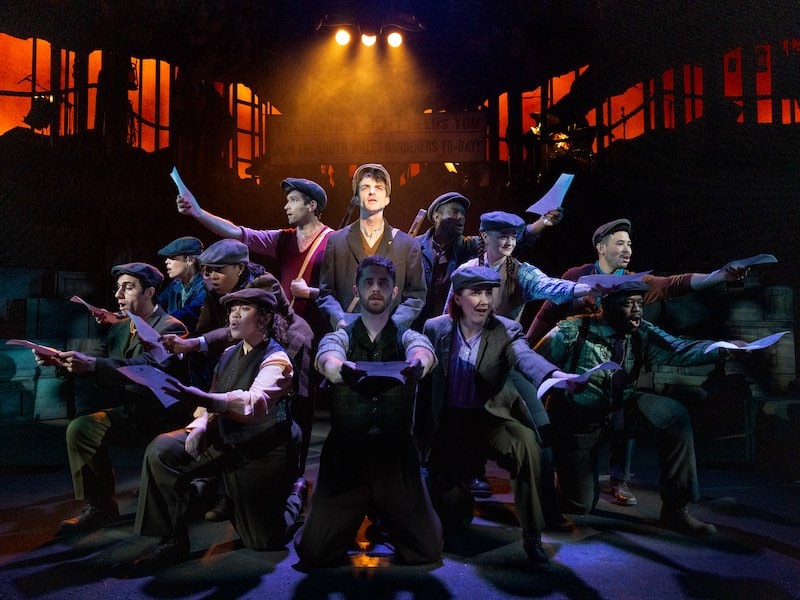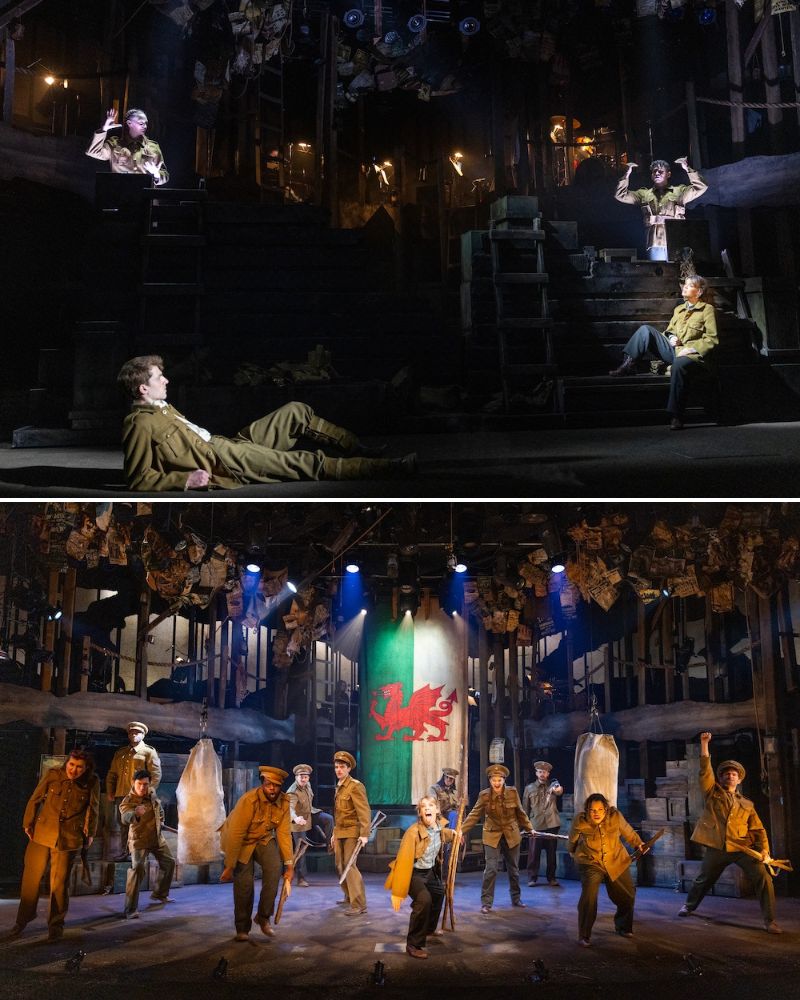Midway through Private Jones, Signature Theatre’s world premiere musical about a Deaf soldier desperate to fit in, comes a breathtaking moment of silence.
In fact, if one tune could speak for this show, which chronicles how a teenage Welsh marksman conquers barriers to serve in World War I, the song “Silence” is it. It accompanies the first scene at the front lines, when, suddenly, all’s quiet. (All’s quiet on the Western Front, right?) But of the many conceits writer-composer-director Marshall Pailet jams into this gritty, mind-blowing work, that one best hits the mark.
Depicting trench warfare, with ghostly lighting design by Jen Schriever casting the sheen of a black-and-white war movie, against a palette of wood pallets and grime, the troops peer through a haze like the fog of war. They pant, chant, and transform from lads to warriors. As the drumbeat of war crescendoes — bolstered by bold percussionist Sam Carolla — they harmonize dolefully, and the piano plinks, pulsing away endless seconds of waiting. Then, nothing. Then “I thought there’d be more noise,” intones a lone tenor, one of many thought bubbles volleyed among the ranks.

Quiet is the antithesis of what one might expect in the thick of battle. But it comes as a relief amid an explosive production rife with noises that startle and inform. Foley artists onstage deploy umbrellas as flapping birds, a ratchet gadget for the cocking of a rifle, cowbells for hitting a bull’s eye. A puppet, designed by Nicholas Mahon, is passed around, voiced by various players. The workmanlike ensemble, moving from factory to battlefield, is hands-on and all hands.
Re: “all hands”: The company is a mix of Deaf, hard-of-hearing, and hearing actors and each performance incorporates a healthy degree of signing. Billed as a “trilingual” musical, Private Jones blends British Sign Language (the repartee among soldiers), American Sign Language (as presented to the audience by The Storyteller, boisterous Deaf actress Amelia Hensley), and Welsh-soaked spoken English. Pailet’s book and lyrics are also projected as dynamic captions — honestly, the Welsh dialect, perfected by coach Catherine Flye, is so thick, it’s a blessing that even hearing viewers get to read along.
Mostly a blessing, that is, because although the production has Signature’s signature spit-shine polish, much of the material remains crude — crude in form if not content befitting wartime trash talk. For example, an entire song in which “Bastards!” is the only memorable lyric — with the emphasis on the wrong syllable, so it sounds like “bas-TURDS” — gets reprised repeatedly, exhaustively, assaulting patrons’ ears.
An imbalance in sound levels between the orchestra and voices contributes to the aural assault as actors navigate the boxy, body-strewn, poetic maze of a set designed by Christopher and Justin Swader. It’s a shame to be blasted by sound when the musicianship is uniformly A-class, starting with Johnny Link, an accomplished actor who was born hard of hearing and inhabits Private Jones like a second skin. With chiseled features and boyish charm, he dutifully straddles wide-eyed wonder and world-weariness. His pitch-perfect falsetto could melt your heart.
Next up are Leanne Antonio, who kills as nurse-muse Gwenolyn and haunting comrade Evans; David Aron Damane, flawless as the father and drill sergeant; and Vincent Michael, nee Kempski, whose double-barreled baritone adds glory and texture to a soundscape that otherwise plateaus.
And while it’s rare to applaud a casting director in a review — amid a roster largely imported from the show’s autumn boot camp in Connecticut — Jorge Acevedo scored a huge victory by selecting the incomparable Erin Weaver as King, hands-down this production’s secret weapon, certifiable as both songbird and clown.
Pailet’s germ of an idea is genius: What would the war experience be like for someone who can’t hear the chaos? After discovering “two sentences” in a historical article about a real-life, well-liked Pvt. Gomer Jones, who was Deaf from infancy yet managed to enlist as a sniper, Pailet developed the portrait of a private who could fake his way onto the battlefield because he’d lost his hearing older, as an adolescent, after a bout of meningitis and could already speak and read lips. Initially, he knows nothing of sign language, and Private Jones becomes an eye-opening tutorial — and testimonial — for him and the audience alike.

War and Gomers apparently go hand in hand. Consider the golly-gee Gomer Pyle of TV land giving rise to the tragic scapegoat Pvt. Leonard “Gomer” Lawrence of Full Metal Jacket, whose inability to fit in led him to take solace in his rifle and finally surrender to his demons. Pailet’s Gomer, an “Everyman” Jones and perhaps distant cousin to those two, also discovers an uncanny talent as a sharpshooter and a love affair with his gun. (Thankfully, for all his aiming into the house, it’s just a harmless, stylish stick.) Jones eschews nonconformity, the thing that makes him different and forces him to live inside his head — his Deafness, an “invisible” distinction — in favor of regimentation. Yet the goal to be like everyone else backfires, for the ragtag band he joins are fellow misfits. Rather than isolate him, they defend and support him for his uniqueness.
While he finds a worthy nemesis in Michael’s Edmund (again, wow, way to flex those acting muscles!), Gomer seems his own worst enemy, repeatedly facing the choice between being a true “bastard” and showing mercy.
Once a child actor on Broadway who was a replacement Kurt Von Trapp in the acclaimed 1998 revival of The Sound of Music, Pailet has been quoted as saying he believes in injecting “childishness in serious stories and seriousness in stories for children.” Thus, Private Jones is playful, even when swinging violent.
There’s a high body count, and, at times, meaning goes AWOL. Yet I salute Pailet for making art in the trenches. Just as embedded troops rely on one another for survival and to accomplish their mission, so too are these diverse collaborative artists intertwined. With so many hands, they’ve created a smorgasbord for the senses, served with a side of nonsense.
The show’s singsong songbook has no standout themes, however, and might be better served with fewer numbers. Ryan O’Connell’s orchestrations reverberate in shades of metal and sunbursts, and, when the ensemble is given space to shine in chord-like hymns, the score is uplifted. An incantation of the WWI-era, anti-war ditty “Hangin’ on the Old Barbed Wire,” which was improvised in the trenches by grunts in 1914, led here by a ballsy Alex De Bard, is a high point.
But it’s in the silent moments, when the noise is snuffed out and the screens go dark, that onlookers commune on the same page. The uninitiated get a glimmer of what it might mean to live Deaf in the hearing world. Or at least experience the same narrative, as so much gets lost in translation. It’s a reminder that theater is always about perception — what you bring to it and what you take from it.
Running Time: Two hours and 35 minutes, including one 15-minute intermission.
EXTENDED: Private Jones plays through March 17, 2024, in the MAX Theatre at Signature Theatre, 4200 Campbell Avenue, Arlington, VA. For tickets ($40–$99), call (703) 820-9771 or purchase online. Information about ticket discounts is available here.
The program for Private Jones is online here.
Closed captions are available via the GalaPro app. ASL-interpreted performances are scheduled for Thursday, February 22, at 8 p.m.; Tuesday, February 27, at 7:30 p.m.; and Sunday, March 10, 2 p.m.
COVID Safety: Masks are always optional but strongly encouraged in the lobby and other public areas of the building. Face masks are required inside the performance spaces on February 18 at 2 p.m. and on March 6 at 7:30 p.m. Face masks are optional but strongly encouraged inside the performance spaces at other performances. Signature’s COVID Safety Measures can be found here.




